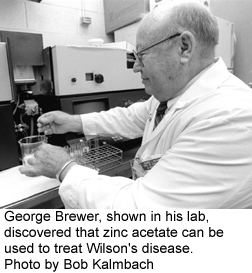The University Record, May 6, 1997
Orphan disease treatment an accidental discovery
From Medical Center Public Relations
Dementia. Drooling. Slurred speech. Temper outbursts. Violent tremors.
 These are just a few of the symptoms of a potentially fatal condition called Wilson’s disease, a recessive genetic disorder that interferes with the body’s ability to excrete copper. If left untreated, the metal collects in the liver and brain, causing severe damage. Symptoms are often misdiagnosed as hepatitis, substance abuse or Parkinson’s disease, thus delaying treatment and increasing the possibility of permanent organ damage.
These are just a few of the symptoms of a potentially fatal condition called Wilson’s disease, a recessive genetic disorder that interferes with the body’s ability to excrete copper. If left untreated, the metal collects in the liver and brain, causing severe damage. Symptoms are often misdiagnosed as hepatitis, substance abuse or Parkinson’s disease, thus delaying treatment and increasing the possibility of permanent organ damage.
Researchers at the Medical Center have developed a drug, recently approved by the federal government, that can halt the progression of—and often completely reverse—the symptoms of Wilson’s disease. The disorder strikes some 5,000 Americans, usually during their teen-age or young-adult years.
Called zinc acetate and pioneered by George Brewer, professor of human genetics and of internal medicine, the drug is now available under the brand name Galzin, manufactured by Gate Pharmaceuticals.
It works by blocking the absorption of copper from the intestine. It must be taken for the rest of a patient’s life to keep copper levels in check and prevent disabling symptoms from recurring.
Brewer discovered the benefits of zinc acetate in lowering copper levels by accident about 15 years ago, while working with sickle cell anemia patients. He noticed that it caused copper deficiency in some patients. He then tried it among Wilson’s disease sufferers and, over time, their symptoms largely disappeared.
Since then, he has drawn Wilson’s disease patients from around the world to the General Clinical Research Center—the only place in the nation that researches this disease and treats large numbers of patients.
Because Wilson’s is considered an “orphan disease”—one that affects fewer than 200,000 people—the recent approval of zinc acetate is especially significant, since most drug companies are unwilling to sponsor orphan drugs for market approval due to the lack of profit potential.
According to the National Organization of Rare Disorders, of the 5,000 orphan diseases in the United States, only about 140 have approved drug treatments.
“It’s exciting to have zinc acetate become an official therapy for Wilson’s disease,” says Brewer, who credits Gate Pharmaceuticals for its support, as well as the resources of the Clinical Research Center and its staff, which make possible meticulous control of the amount of copper in each patient’s meal.

